1. Overview
Željko Komšić (Željko KomšićCroatian, born 20 January 1964) is a prominent Bosnian Croat politician who has served as the Croat member of the Presidency of Bosnia and Herzegovina since 2018, a position he previously held from 2006 to 2014. He is notable for being the first and, so far, only Croat member to serve more than two terms, having been re-elected for a fourth term in the 2022 Bosnian general election.
Komšić began his political career with the Social Democratic Party of Bosnia and Herzegovina (SDP BiH), serving in municipal roles and as an ambassador. He later founded the Democratic Front (DF) in 2013, a party characterized by its social democratic, civic-nationalist, and unitary principles. His political philosophy centers on strengthening the central institutions of Bosnia and Herzegovina and promoting a civic state over ethnic divisions. His elections to the Presidency have been a recurring source of controversy, as he has primarily been elected by Bosniak voters rather than Bosnian Croats, leading to accusations of illegitimacy from many Croat political representatives. Despite this, Komšić maintains that he represents all citizens of Bosnia and Herzegovina, advocating for a unified and inclusive state.
2. Early life and education
Željko Komšić's early life was marked by his upbringing in Sarajevo and his experiences during the Bosnian War, which significantly shaped his political views and commitment to a unified Bosnia and Herzegovina.
2.1. Birth and family
Komšić was born on 20 January 1964 in Sarajevo, then part of the Socialist Republic of Bosnia and Herzegovina within the Socialist Federal Republic of Yugoslavia. His father, Marko Komšić, was a Bosnian Croat, and his mother, Danica Stanić, was a Bosnian Serb. His mother was tragically killed on 1 August 1992 by a sniper from the Army of Republika Srpska while sipping coffee in her apartment during the devastating siege of Sarajevo. This event is widely regarded as a pivotal moment for Komšić, as he was already enlisted in the Army of the Republic of Bosnia and Herzegovina at the time.
His maternal grandfather, Marijan Stanić, who was a Chetnik during World War II, died two years before Komšić's birth. The Stanić family originated from the village of Kostajnica, near Doboj. Komšić's paternal family hails from Kiseljak, and his paternal uncle, an Ustasha, disappeared during World War II. Although baptized a Catholic like his father, Komšić later left the Catholic Church and identifies as a agnostic. He is married to Sabina Komšić, an ethnic Bosniak, and they have a daughter named Lana.
2.2. Education
Komšić pursued higher education at the University of Sarajevo, where he earned a Bachelor of Laws degree from its Faculty of Law. His academic and professional development also included his selection to represent Bosnia and Herzegovina at the prestigious annual Georgetown Leadership Seminar in Washington, D.C. in 2003.
2.3. Bosnian War and military service
During the Bosnian War (1992-1995), Željko Komšić served in the Army of the Republic of Bosnia and Herzegovina (ARBiH). He was a platoon leader and part of the Hrasno Territorial Defence, the 101st Motorised Brigade, and the 1st Corps of the Armed Forces of Republic of Bosnia and Herzegovina. For his military merits and contributions during the conflict, he was awarded the Order of the Golden Lily in 1995, which was the highest state order for military decorations at the time.
3. Political career
Željko Komšić's political career has been characterized by a consistent advocacy for a civic-oriented, unified Bosnia and Herzegovina, often challenging the ethnically-based political structures established by the Dayton Agreement.
3.1. Early political activities
Following the Bosnian War, Komšić began his political career as a member of the Social Democratic Party of Bosnia and Herzegovina (SDP BiH). He quickly rose through the ranks, serving as a councilman for the municipality of Novo Sarajevo and later within the Sarajevo City Council. In 2000, he was elected as the head of the municipal government of Novo Sarajevo. He subsequently served as the deputy mayor of Sarajevo for two years.
In 1998, when the "Alliance for Democratic Change" coalition came to power, Komšić was appointed as the ambassador to the then-existing Federal Republic of Yugoslavia in Belgrade. He held this diplomatic post until 2002, when he resigned after the SDP returned to opposition following the general elections.
3.2. Founding of the Democratic Front
Komšić's departure from the Social Democratic Party (SDP BiH) in July 2012 marked a significant turning point in his political career, driven by disagreements over the party's agreements with the Croatian Democratic Union of Bosnia and Herzegovina (HDZ BiH). This led him, along with other dissidents, to establish the Democratic Front (DF) on 7 April 2013.
The Democratic Front quickly established itself as a political force, operating predominantly among Bosniak and pro-Bosnian voters within the Federation of Bosnia and Herzegovina. The party's ideology is characterized as a unitary, social democratic, and civic-nationalist center-left party. This platform emphasizes a unified, multi-ethnic state over ethnically divided governance, aligning with Komšić's long-standing political vision.
3.3. First presidency term (2006-2014)
Komšić's first two terms as the Croat member of the Presidency were marked by significant electoral victories and ongoing controversy regarding his legitimacy as a representative of the Croat people.
3.3.1. 2006 general election
In the 2006 Bosnian general election, Željko Komšić ran as the Social Democratic Party of Bosnia and Herzegovina's candidate for the Croat seat in the Presidency of Bosnia and Herzegovina. He secured a notable victory, receiving 116,062 votes, which accounted for 39.6% of the total. He surpassed several other candidates, including Ivo Miro Jović of the Croatian Democratic Union of Bosnia and Herzegovina (HDZ BiH) with 26.1%, Božo Ljubić of Croatian Democratic Union 1990 (HDZ 1990) with 18.2%, Mladen Ivanković-Lijanović of the People's Party Work for Prosperity (NSRzB) with 8.5%, Zvonko Jurišić of the Croatian Party of Rights of Bosnia and Herzegovina (HSP) with 6.9%, and Irena Javor-Korjenić with 0.7%. Komšić was sworn into office on 6 November 2006.
His victory was widely attributed to a split within the HDZ BiH party, which allowed the SDP to garner a majority of the Bosniak votes. This outcome, however, led to significant criticism from many Bosnian Croats, who viewed Komšić as an illegitimate representative of their interests because he was elected predominantly by Bosniak voters.
3.3.2. 2010 general election
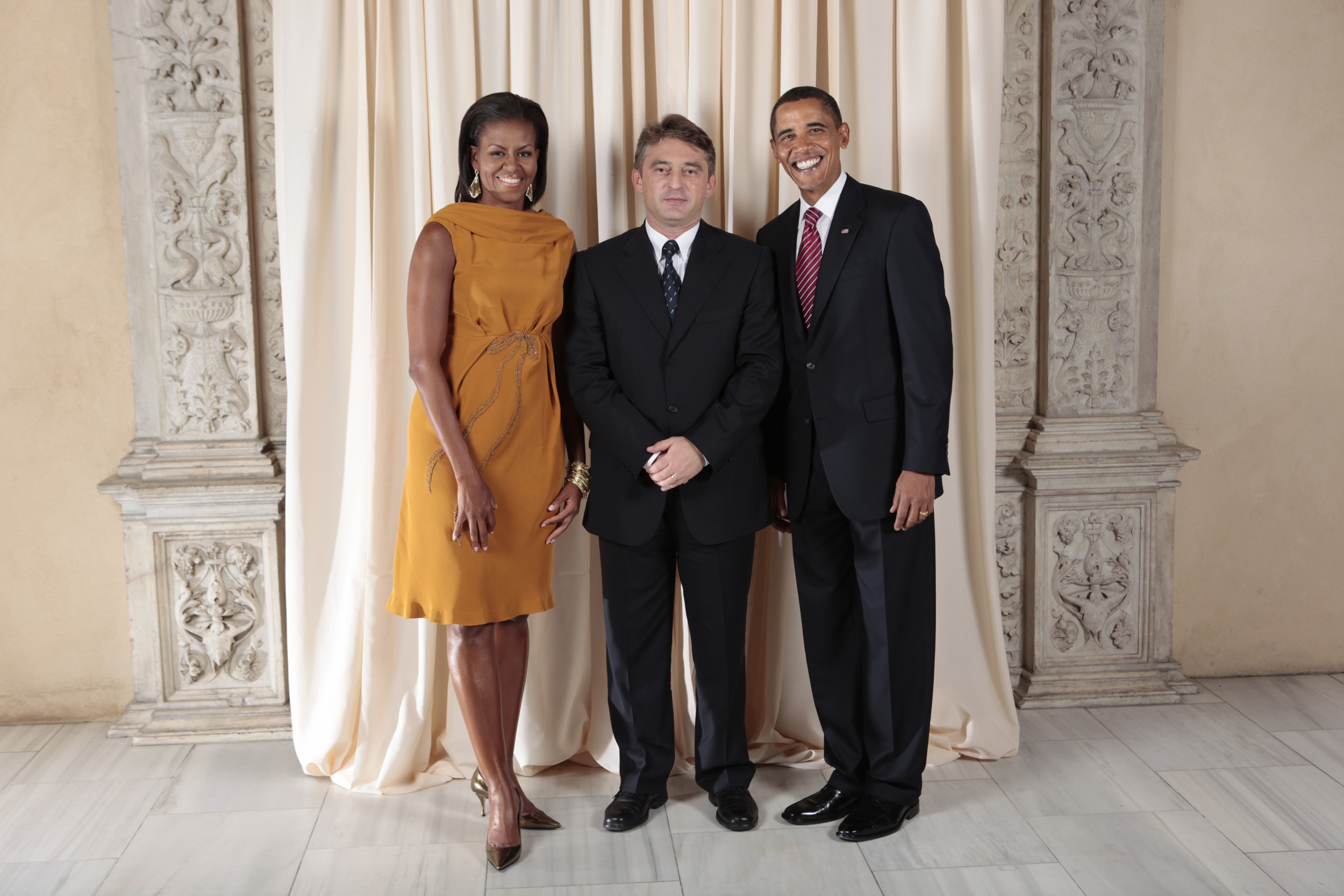
In the 2010 Bosnian general election, Željko Komšić was re-elected to the Presidency, securing an even more decisive victory with 337,065 votes, representing 60.6% of the total. His closest competitor was Borjana Krišto of the Croatian Democratic Union of Bosnia and Herzegovina (HDZ BiH), who received 19.7% of the votes. Other candidates included Martin Raguž (Croatian Coalition; 10.8%), Jerko Ivanković Lijanović (NSRzB; 8.1%), Pero Galić (0.3%), Mile Kutle (0.2%), and Ferdo Galić (0.2%).
Komšić's re-election in 2010 was highly contested by Croat political representatives, who largely viewed it as a form of electoral fraud. The electoral system in the Federation of Bosnia and Herzegovina allows any citizen to vote for either a Bosniak or a Croat representative. Given that Bosniaks constitute approximately 70% of the Federation's population while Croats make up only 22%, a candidate running for the Croat seat can be effectively elected even without securing a majority of votes from the Croat community, provided they receive sufficient support from Bosniak voters. This scenario occurred in both the 2006 and 2010 elections, where Komšić, an ethnic Croat backed by the multiethnic Social Democratic Party, won with very few Croat votes.
In 2010, Komšić did not win in a single municipality with a Croat-majority or plurality. Instead, nearly all of these municipalities voted for Borjana Krišto. The overwhelming majority of Komšić's votes came from predominantly Bosniak areas. He performed poorly in Croat municipalities, receiving less than 2.5% of the electorate in areas such as Široki Brijeg, Ljubuški, Čitluk, Posušje, and Tomislavgrad, and failing to gain even 10% in many others. For instance, he received over 7,000 votes from the Bosniak-majority municipality of Kalesija, where only about 20 Croats resided at the time. Considering the total Croat population in the Federation of Bosnia and Herzegovina was estimated to be around 495,000, Komšić's 336,961 votes significantly outnumbered the combined 230,000 votes received by all other Croat candidates. Consequently, many Croats continued to regard him as an illegitimate representative, often treating him as a "second Bosniak member" of the Presidency. This situation intensified frustration among Croats, eroded their trust in federal institutions, and fueled calls for the creation of their own entity or a distinct federal unit.
3.3.3. Domestic policy (2006-2014)
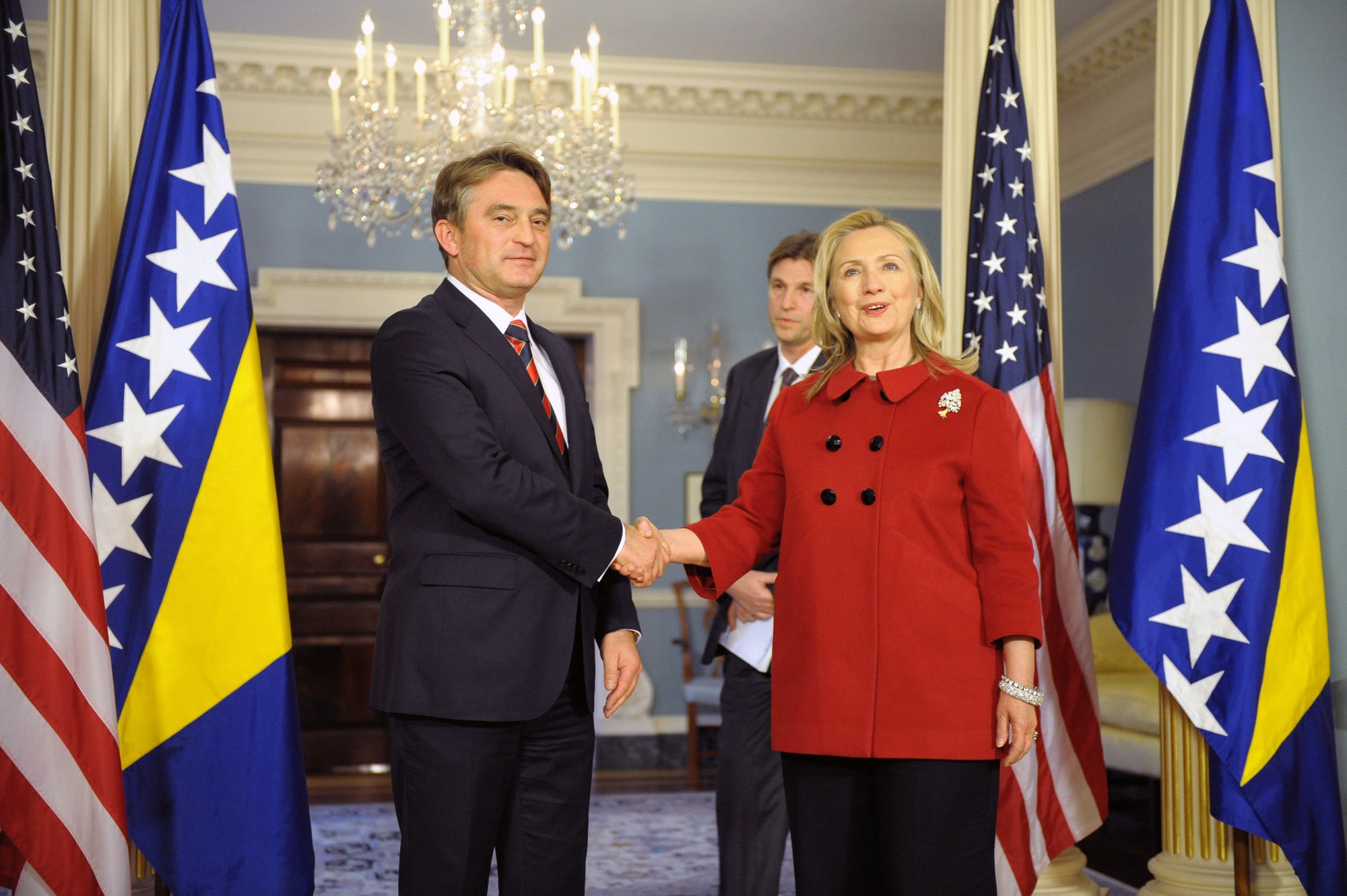
During his first tenure in the Presidency, Željko Komšić engaged in various domestic policy matters and maintained a distinct political stance. In May 2008, a notable linguistic debate arose when Haris Silajdžić, then the Bosniak member of the Presidency, stated during a visit to Washington, D.C. that Bosnia and Herzegovina has only one language, albeit with three names. This statement provoked strong negative reactions from Croat political parties and from Milorad Dodik, who was then the Prime Minister of Republika Srpska. Komšić publicly countered Silajdžić, asserting that it was not his place to determine the number of languages spoken in Bosnia and Herzegovina.
According to a study conducted by the National Democratic Institute in 2010, Komšić was identified as the most popular politician among Bosniaks. His increasing popularity among Bosniak voters, coupled with the ongoing controversy surrounding his election as the Croat member, eventually contributed to his decision to leave the Social Democratic Party in July 2012. This departure was a precursor to his founding of the Democratic Front in April 2013, a party that would further solidify his political identity as a proponent of a unitary, civic-nationalist, and social democratic vision for Bosnia and Herzegovina.
3.4. Second presidency term (2018-present)
Komšić's return to the Presidency in 2018 marked the beginning of his third and fourth terms, characterized by continued domestic and foreign policy engagements, as well as persistent controversies surrounding his electoral legitimacy.
3.4.1. 2018 general election
Željko Komšić officially announced his candidacy for the Croat member of Bosnia's three-person Presidency of Bosnia and Herzegovina on 11 January 2018, ahead of the 2018 Bosnian general election. The election, held on 7 October 2018, saw Komšić once again elected to the Presidency, securing 52.64% of the vote. The incumbent Bosnian Croat presidency member, Dragan Čović, finished second with 36.14%. This victory continued the trend of Komšić's election primarily through the support of Bosniak voters, reigniting the debate over his legitimacy as a representative of the Croat people.
3.4.2. Domestic policy (2018-present)
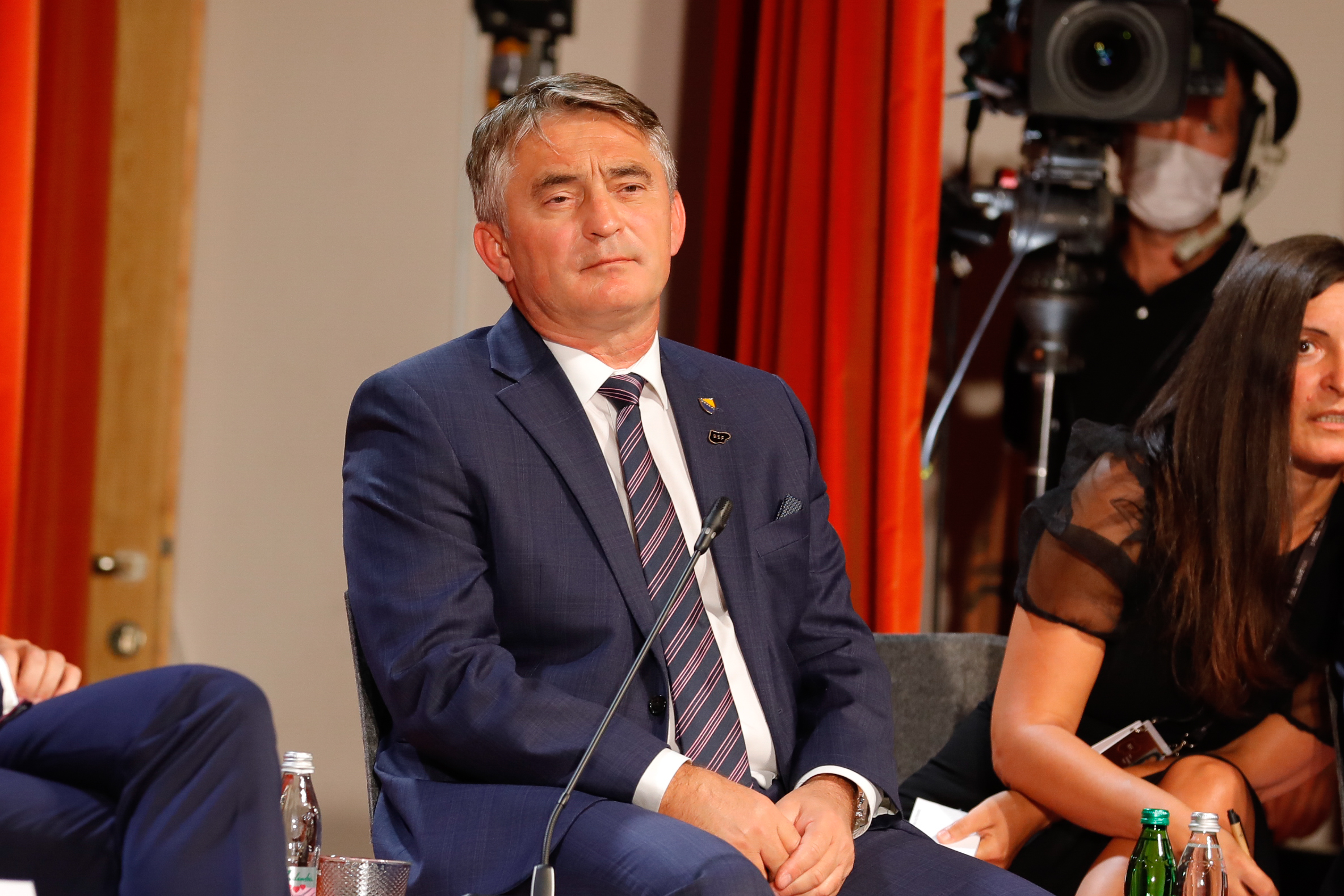
In March 2019, Komšić appointed Serbian politician and businessman Čedomir Jovanović as his advisor. A notable moment in his domestic policy was his public support for the first BIH Pride March, the LGBT pride parade held in the capital Sarajevo in September 2019. He affirmed his stance by stating, "Bosnia and Herzegovina is a country where everybody can live their life as they wish," underscoring his commitment to human rights and inclusivity.
In May 2021, Komšić, alongside Šefik Džaferović, the Bosniak member of the Presidency, attended a joint military exercise between the United States Army and the Armed Forces of Bosnia and Herzegovina on Mount Manjača, near Banja Luka. This event highlighted a division within the Presidency, as Milorad Dodik, the Serb member, notably refused to attend. In November 2021, during protests by miners over proposed job and wage cuts in the Federation of Bosnia and Herzegovina, Komšić voiced his support for the miners, stating, "The director of the Public Enterprise Electric Utility should resign, as soon as minister Džindić and prime minister Novalić resign."
Following the 2022 Bosnian general election, Komšić was re-elected to the Presidency for a record fourth term, securing 55.80% of the vote. Borjana Krišto of the Croatian Democratic Union of Bosnia and Herzegovina (HDZ BiH) came in second with 44.20%. He was sworn in for his fourth term on 16 November 2022, alongside newly elected members Denis Bećirović and Željka Cvijanović. In December 2022, when a new government coalition nominated Borjana Krišto as the new Chairwoman of the Council of Ministers, Komšić voted against her nomination, stating that Krišto "did not outline her programme as designate."
3.4.3. COVID-19 pandemic
As the COVID-19 pandemic in Bosnia and Herzegovina began in March 2020, the Presidency, including Komšić, announced that the Armed Forces would deploy quarantine tents at the country's borders. These tents were intended for Bosnian citizens returning home, who were obligated to self-quarantine for 14 days upon arrival. Tents were primarily set up on the northern border with Croatia.
In March 2021, Komšić and his fellow presidency members, Džaferović and Dodik, met with Serbian President Aleksandar Vučić in Sarajevo, who donated 10,000 doses of AstraZeneca COVID-19 vaccines to assist with the pandemic response. Just three days later, on 5 March, Slovenian President Borut Pahor also visited Sarajevo and met with the Presidency members, announcing Slovenia's donation of 4,800 AstraZeneca COVID-19 vaccines.
3.4.4. Military helicopters controversy
In August 2021, a significant controversy arose regarding the deployment of military helicopters to combat wildfires raging in Herzegovina. Komšić and Džaferović, acting without the consent of the third Presidency member, Milorad Dodik, instructed the Ministry of Security to make the Bosnian Armed Forces available for putting out the fires. This action was taken because Dodik had refused to give his consent for the use of military helicopters, which is required by the Bosnian constitution for the deployment of military assets. Komšić and Džaferović's decision highlighted the ongoing political gridlock and ethnic divisions within Bosnia and Herzegovina's governing bodies.
3.4.5. Balkan non-papers
In April 2021, Komšić took a proactive diplomatic step by sending a non-paper to EU foreign ministers. In this document, he sharply criticized EU Delegations for what he perceived as an overly lenient attitude towards the nationalistic Bosnian parties, the Alliance of Independent Social Democrats (SNSD) and the Croatian Democratic Union of Bosnia and Herzegovina (HDZ BiH). His non-paper focused on several critical issues: Russian influence in the region, the interference of Croatia and Serbia in the internal affairs of Bosnia and Herzegovina, and the problematic relationship dynamics between HDZ BiH and SNSD. He also included a strong critique of the EU's overall conduct in Bosnia and Herzegovina.
In the same month, Komšić responded to a supposed non-paper attributed to Slovenian Prime Minister Janez Janša, which reportedly suggested possible border changes in the Western Balkans. Komšić expressed deep concern, stating that it was "all already orchestrated and only God knows what the outcome will be," indicating his apprehension about external forces attempting to redraw borders in the region.
3.4.6. Foreign policy
Željko Komšić's foreign policy engagement has been marked by a strong defense of Bosnia and Herzegovina's sovereignty and a clear alignment with Western democratic values, often leading to clashes with neighboring countries and internal political rivals.
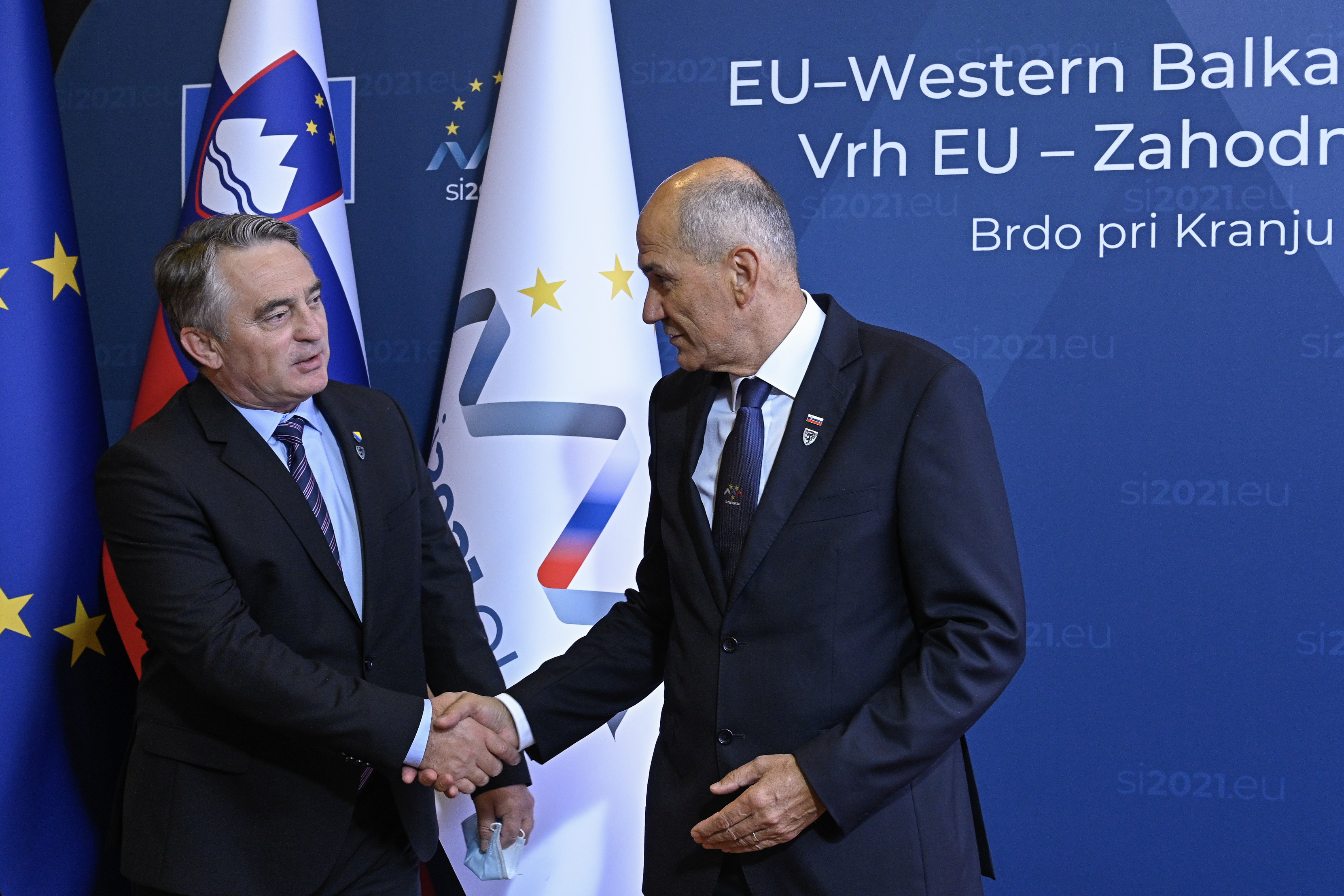
Following the 2018 general election and Komšić's re-election, which was largely due to votes from majority Bosniak areas, Croatian Prime Minister Andrej Plenković, who had endorsed the incumbent Dragan Čović, publicly criticized Komšić's victory. Plenković stated, "We are again in a situation where members of one constituent people ... are electing a representative of another, the Croat people." Komšić responded by accusing the Croatian Government of undermining Bosnia and Herzegovina and its sovereignty. He also announced that Bosnia and Herzegovina might consider suing Croatia over the construction of the Pelješac Bridge. The bridge, largely funded by the EU, began construction on 30 July 2018 to connect Croatia's territory and was supported by Komšić's main election opponent, Dragan Čović.
In December 2020, Komšić, along with Šefik Džaferović, refused to attend a state visit by Russian Foreign Minister Sergey Lavrov. Their decision stemmed from Lavrov's perceived disrespect towards Bosnia and Herzegovina, as he had chosen to first visit only Bosnian Serb leader Milorad Dodik before meeting with the collective Presidency. Komšić stated that Lavrov had "shown disrespect for the state of Bosnia and Herzegovina."
In September 2021, Komšić traveled to New York City to address the United Nations General Assembly at its headquarters. During his visit, he held bilateral meetings with United Nations Secretary-General António Guterres and Austrian President Alexander Van der Bellen on 21 September. On 22 September, Komšić delivered a speech to the General Assembly, focusing on the political challenges facing Bosnia and Herzegovina, the ongoing COVID-19 pandemic, and the issue of climate change. The following day, he met with Montenegrin President Milo Đukanović and Kosovar President Vjosa Osmani. In November 2021, Komšić also attended the 26th United Nations Climate Change Conference (COP26), where he was welcomed by British Prime Minister Boris Johnson and UN Secretary-General António Guterres.
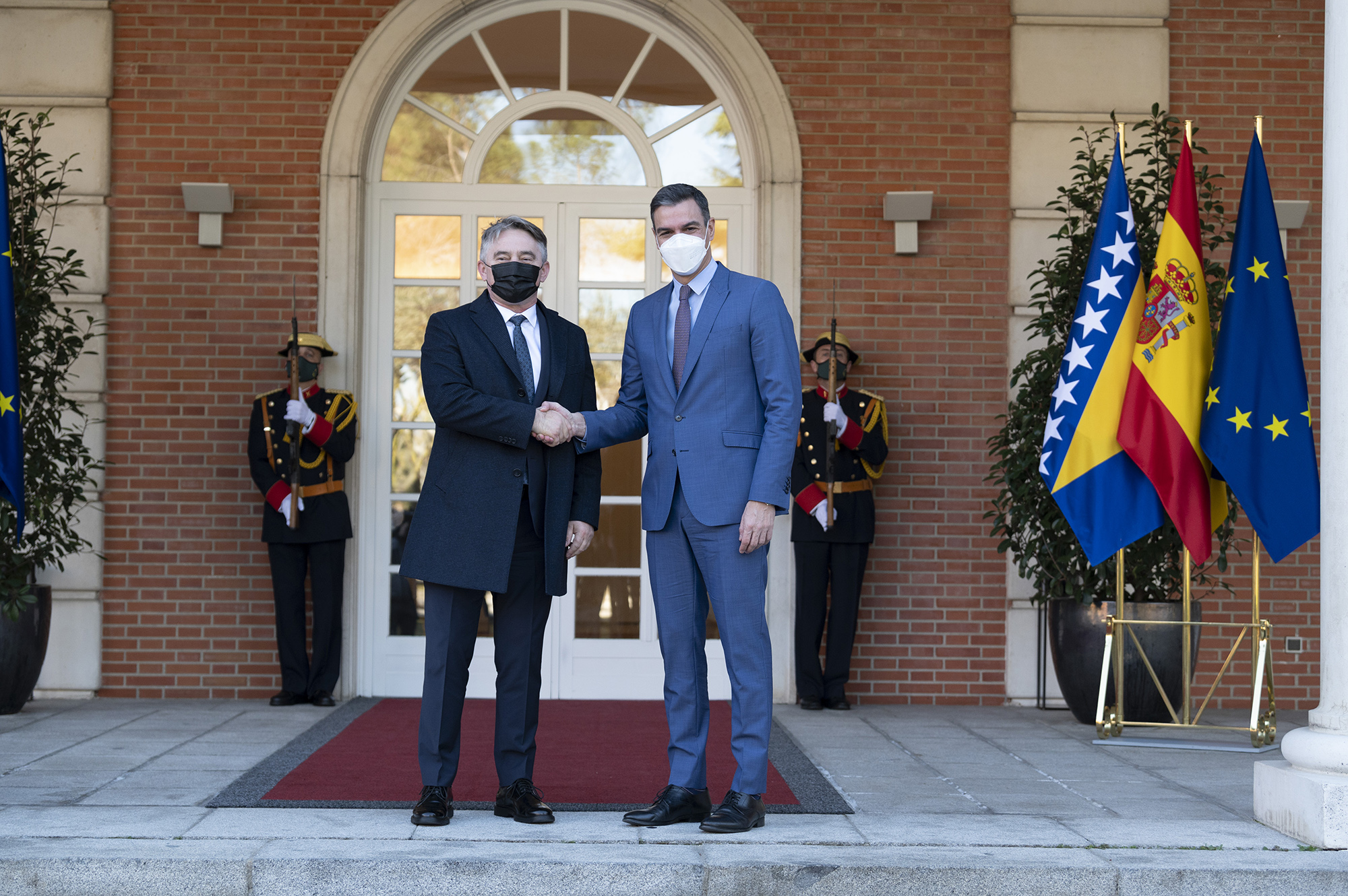
On 17 January 2022, Komšić met with Pope Francis in Vatican City. Following their meeting, Pope Francis reportedly praised Komšić, describing him as "a good person." Less than a month later, on 9 February 2022, Komšić visited Madrid, where he held a bilateral meeting with Spanish Prime Minister Pedro Sánchez and also spoke with King Felipe VI.
Following Russia's recognition of the self-proclaimed Donetsk People's Republic and Luhansk People's Republic as independent states on 21 February 2022, Komšić issued a strong condemnation of "Russia's attack on the territory of Ukraine." When Russian President Vladimir Putin ordered a large-scale invasion of Ukraine on 24 February, Komšić affirmed that Bosnia and Herzegovina would support Ukraine within its capacity.
In October 2023, after Hamas attacked Israel, Komšić offered a nuanced perspective, remarking that Hamas' actions were those of "desperate people" and should be observed within a wider context. He criticized the Chairwoman of the Council of Ministers, Borjana Krišto, for what he called her "hasty and selfish" expression of support for Israel. When the Israeli ambassador to Bosnia and Herzegovina, Galit Peleg, criticized Komšić's statement and defended Krišto, Komšić responded with strong language, calling the ambassador "a malicious lying fool or a manipulated but also malicious fool." He further suggested that "that pervert," referring to Israeli businessman Amir Gross Kabiri, had "persuaded you to this lie and stupidity, because you obviously neither looked at nor listened to my statement and to whom money is more important than the fact that earning it with the followers of the same policy and ideology that participated in the holocaust of your people, is the problem of your country."
3.4.7. European Union relations
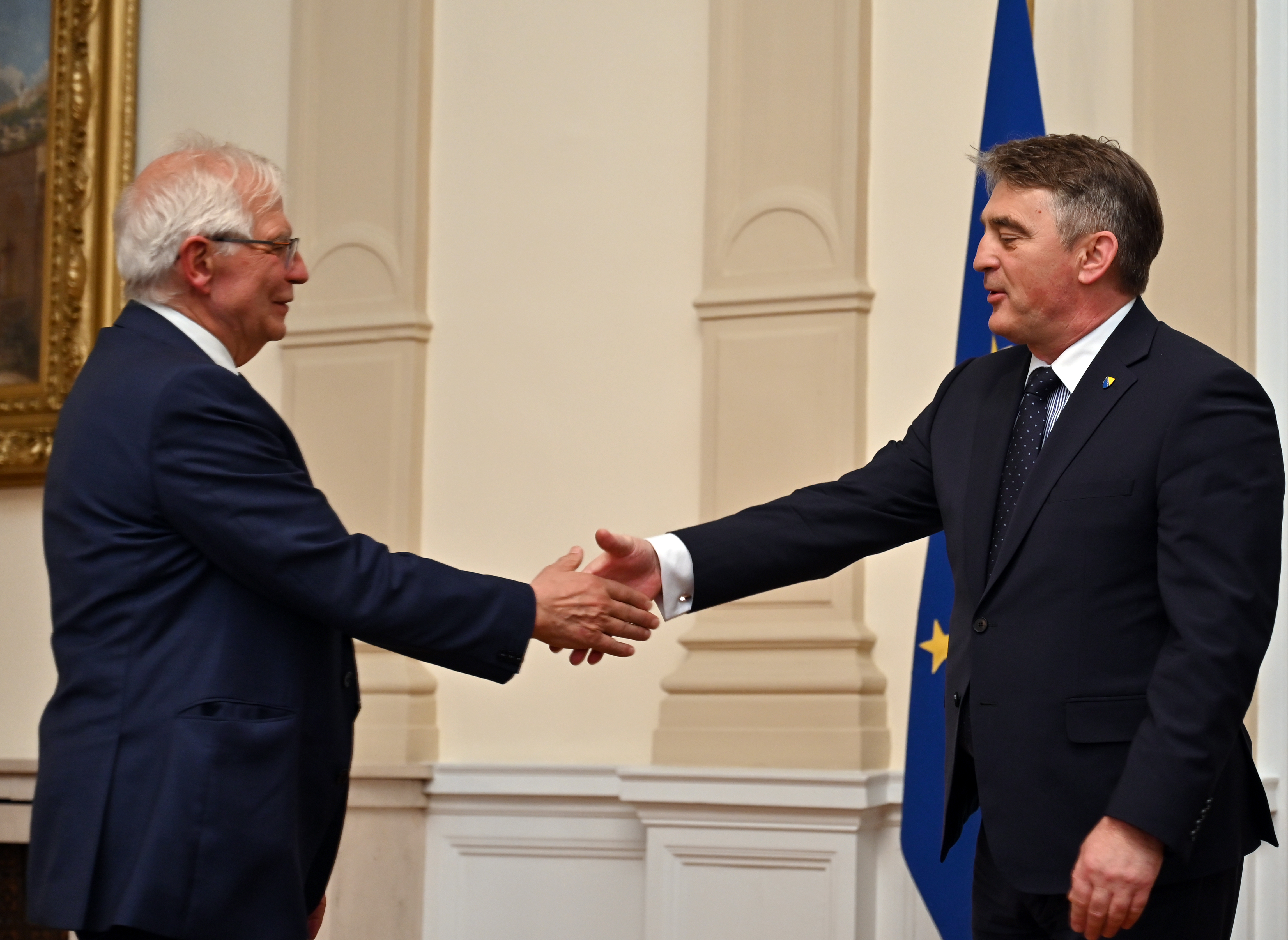
Komšić has been a vocal proponent of Bosnia and Herzegovina's integration into the European Union, actively participating in efforts and discussions related to the country's accession process.
In September 2020, Komšić and his fellow Presidency members expressed optimism that an EU candidate status for Bosnia and Herzegovina could be achieved in 2021, provided the country implemented successful reforms. On 30 September 2021, Komšić, Džaferović, and Dodik met with European Commission President Ursula von der Leyen at the Presidency Building in Sarajevo. This meeting was part of von der Leyen's visit to Bosnia and Herzegovina, during which she also inaugurated the Svilaj border checkpoint and a bridge over the nearby Sava river, a crucial part of the internationally important Pan-European Corridor Vc.
On 1 December 2021, Komšić and Džaferović held a meeting with German Minister of State for Europe Michael Roth. Their discussions primarily focused on the political situation in Bosnia and Herzegovina, ongoing reform processes, and activities aimed at advancing the country's path toward EU membership. In December 2022, Komšić strongly supported the decision by the European Council to recognize Bosnia and Herzegovina as a candidate country for EU accession, hailing it as a "huge, historic move." On 8 February 2024, the Presidency, with Komšić's support, unanimously adopted the decision to commence negotiations with Frontex, a key condition for opening formal accession talks with the EU. Finally, on 21 March 2024, at a summit in Brussels, all 27 EU leaders, representing the European Council, unanimously agreed to open EU accession talks with Bosnia and Herzegovina, following the adoption of two more European laws by the Council of Ministers of Bosnia and Herzegovina. The initiation of these talks is contingent upon the implementation of further reforms.
3.4.8. Relations with Turkey
Relations with Turkey have been a significant aspect of Komšić's foreign policy, involving high-level state visits and agreements on various sectors.
On 16 March 2021, Komšić, along with Džaferović and Dodik, embarked on a state visit to Turkey to meet with Turkish President Recep Tayyip Erdoğan. During this visit, Erdoğan pledged to donate 30,000 COVID-19 vaccines to Bosnia and Herzegovina to aid its pandemic response. Additionally, Bosnia and Herzegovina and Turkey reached an agreement on the mutual recognition and exchange of driving licenses. They also signed an agreement on cooperation in infrastructure and construction projects, notably including the construction of a highway connecting Bosnia and Herzegovina's capital, Sarajevo, to Serbia's capital, Belgrade. The agreement was signed by the Minister of Communication and Traffic, Vojin Mitrović.
On 27 August 2021, President Erdoğan made a reciprocal state visit to Sarajevo, where he met with all three Presidency members. Discussions during this meeting centered on enhancing economic and infrastructural cooperation, with a particular focus on the progress of the Sarajevo-Belgrade highway construction. A trilateral meeting involving Turkey, Serbia, and Bosnia and Herzegovina was also agreed upon for the near future.
3.5. Presidency Chairman roles
Željko Komšić has held the rotating position of Chairman of the Presidency of Bosnia and Herzegovina multiple times throughout his tenures as the Croat member of the Presidency. The chairmanship rotates among the three members every eight months.
His terms as Chairman include:
- From July 2023 to March 2024, succeeding Željka Cvijanović and followed by Denis Bećirović.
- From July 2021 to March 2022, succeeding Milorad Dodik and followed by Šefik Džaferović.
- From July 2019 to March 2020, succeeding Milorad Dodik and followed by Šefik Džaferović.
- From July 2013 to March 2014, succeeding Nebojša Radmanović and followed by Bakir Izetbegović.
- From July 2011 to March 2012, succeeding Nebojša Radmanović and followed by Bakir Izetbegović.
- From July 2009 to March 2010, succeeding Nebojša Radmanović and followed by Haris Silajdžić.
- From July 2007 to March 2008, succeeding Nebojša Radmanović and followed by Haris Silajdžić.
4. Ideology and philosophy
Željko Komšić's political ideology and philosophy are deeply rooted in the principles of social democracy, civic nationalism, and the concept of a unitary state. These tenets form the core of the Democratic Front (DF), the party he founded and leads.
Komšić advocates for a Bosnia and Herzegovina where citizenship, rather than ethnic affiliation, is the primary basis for political representation and rights. This civic-nationalist stance stands in contrast to the current ethnically-based power-sharing arrangements established by the Dayton Agreement, which he and his party often criticize for perpetuating divisions. He envisions a more centralized and unified state, where institutions function effectively across ethnic lines, promoting equality for all citizens regardless of their background.
His social democratic leanings are reflected in his concern for social justice and economic equality, as evidenced by his public support for miners' protests and his general emphasis on the welfare of ordinary citizens. Komšić's consistent challenge to the legitimacy of his election by predominantly Bosniak votes, while controversial to some Croat representatives, is framed by him as a necessary step towards a truly multi-ethnic and civic-oriented state, rather than one defined by ethnic quotas. He seeks to dismantle the perception of the Presidency members as mere ethnic representatives, instead viewing them as representatives of all Bosnian citizens.
5. Personal life
Željko Komšić is married to Sabina Komšić, an ethnic Bosniak, and they have a daughter named Lana. While raised Catholic, he identifies as a self-described agnostic, having left the Catholic Church.
Beyond his political and family life, Komšić is known for his support of the Declaration on the Common Language, a document signed by prominent figures from Bosnia and Herzegovina, Croatia, Serbia, and Montenegro, advocating for a shared linguistic standard. He is also an avid supporter of the Sarajevo-based football club FK Željezničar Sarajevo.
6. Awards and decorations
Željko Komšić has received notable recognition for his service, particularly during the Bosnian War.
| Award or decoration | Country | Awarded by | Year | Place | |
|---|---|---|---|---|---|
 | Order of the Golden Lily | Republic of Bosnia and Herzegovina | Alija Izetbegović | 1995 | Sarajevo |
7. Controversies and criticism
Željko Komšić's political career has been frequently marked by controversy, primarily stemming from the unique circumstances of his election as the Croat member of the Presidency.
7.1. Election representation controversy
The most significant and recurring controversy surrounding Željko Komšić is the legitimacy of his representation as the Croat member of the Presidency of Bosnia and Herzegovina. This criticism arises from the fact that he has been elected primarily by Bosniak voters, rather than by a majority of Croat voters, in the Federation of Bosnia and Herzegovina.
Under the Bosnian electoral system, citizens in the Federation can vote for either a Bosniak or a Croat representative for the Presidency. Given that Bosniaks constitute approximately 70% of the Federation's population, while Croats make up only around 22%, a candidate running for the Croat seat can secure victory even without substantial support from the Croat community, provided they receive enough votes from Bosniak voters. This scenario occurred in Komšić's initial elections in 2006 and 2010, and again in 2018 and 2022.
In the 2010 election, for instance, Komšić did not win in a single municipality with a Croat-majority or plurality. The bulk of his votes came from predominantly Bosniak areas, and he received very little support in Croat-majority municipalities in Western Herzegovina, such as Široki Brijeg, Ljubuški, Čitluk, Posušje, and Tomislavgrad. His total vote count significantly surpassed the combined votes for all other Croat candidates, despite the relatively small Croat population in the Federation.
This electoral outcome has led many Croat political representatives and a significant portion of the Bosnian Croat community to consider Komšić an illegitimate representative of their interests. They often refer to him as a "second Bosniak member" of the Presidency, arguing that his election undermines the principle of constituent people's representation enshrined in the Dayton Agreement. This situation has fueled frustration among Croats, eroding their trust in federal institutions and strengthening calls for their own electoral unit or a more ethnically distinct federal arrangement. Croatian Prime Minister Andrej Plenković also publicly criticized Komšić's victory in 2018, echoing the sentiment that members of one constituent people were electing a representative of another.
8. Impact
Željko Komšić's political activities and ideas have had a profound and often polarizing impact on Bosnia and Herzegovina's political landscape and inter-ethnic relations. His consistent advocacy for a unitary, social democratic, and civic-nationalist vision for the country directly challenges the ethnically-based power-sharing framework established by the Dayton Agreement.
His repeated elections as the Croat member of the Presidency, primarily through the votes of Bosniak citizens, have ignited a fundamental debate about the nature of political representation in Bosnia and Herzegovina. While his supporters view him as a champion of a civic state where all citizens are equal, regardless of ethnicity, many Bosnian Croats perceive his elections as illegitimate and a threat to their constitutional rights as a constituent people. This ongoing controversy has deepened political divisions, undermined trust in federal institutions among some ethnic groups, and fueled calls for electoral reforms or even further ethnic territorial divisions.
Komšić's firm stance against what he perceives as divisive or anti-state actions by other political figures, particularly Serb and some Croat leaders, has solidified his image as a defender of Bosnian statehood and sovereignty. His engagement in foreign policy, including his strong condemnation of Russia's actions in Ukraine and his efforts to align Bosnia and Herzegovina more closely with the European Union and the United States, reflects his commitment to a pro-Western, democratic future for the country. However, his outspoken nature and sometimes confrontational approach have also contributed to diplomatic tensions with neighboring countries like Croatia and Serbia. Overall, Komšić remains a central and controversial figure, whose actions continue to shape the ongoing struggle for Bosnia and Herzegovina's political identity and future direction.